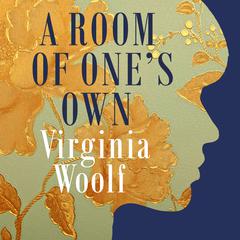 Play Audiobook Sample
Play Audiobook Sample
Jacob’s Room Audiobook
 Play Audiobook Sample
Play Audiobook Sample
Quick Stats About this Audiobook
Total Audiobook Chapters:
Longest Chapter Length:
Shortest Chapter Length:
Average Chapter Length:
Audiobooks by this Author:
Publisher Description
This impressionistic novel by Virginia Woolf marks the author’s first move toward the experimentation for which she would later become recognized. Through a montage of passing images, conversations, and stream-of-consciousness monologues, it tells the story of Jacob Flanders, an idealistic and sensitive young man attempting to reconcile his love of classical culture with the chaotic reality of contemporary society. As Jacob grows from childhood into adulthood, we follow his experiences in college and in travels, in love and in war, through the perspectives and impressions of the various people in his life.
Jacob’s Room established Virginia Woolf's reputation as a highly poetic and symbolic writer who places emphasis not on plot or action but on the psychological realm of her characters. Hailed by friends such as T. S. Eliot, the book represents a turning point in the history of the English novel. Wrote E. M. Forster, “The impossible has occurred…A new type of fiction has swum into view.”
Download and start listening now!
"A lyrical account of a cherished young man coming of age. Filled with profound truths about the differences in the sexes; "Beauty in women is dumb, but we are afriad of a beautiful man." Ultimately I fell in love with Jacob, but be warned - the ending is disappointing."
— Tiffany (5 out of 5 stars)
Quotes
-
“There is no disillusionment in [Woolf’s] work, but, instead of that, a fine realization of the intrinsic beauty of life and a dominant sympathy with her characters...the reader must feel that Jacob has been victorious in his brief wrestling with life.”
— New York Times -
“[Wanda McCaddon] reads Virginia Woolf’s stream of consciousness…with such force and authority that gradually, in the poetry of these images, a character, albeit somewhat lost and stillborn, breaks through into a hollow world, exactly as Woolf intended. It is the narrator’s assurance, as it was the writer’s belief before her, that this stream of consciousness cataloging would produce both world and character, and so it does.”
— AudioFile -
“Mrs. Woolf is a considerable writer, and plays tricks with a fine literary sense...Perhaps she will yet convince us that this is the way to write novels or one of the ways. One would like to read another book of hers when she has returned to convention. Or, perhaps, even before.”
— Guardian -
“The coherence of the book is even more amazing than its beauty. In the stream of glittering similes, unfinished sentences, hectic catalogues, and unanchored proper names, we seem to be going nowhere. Yet the goal comes, the method and the matter prove to have been one, and looking back from the pathos of the closing scene, we see for a moment the airy drifting atoms piled into a colonnade.”
— E.M. Forster
Jacob’s Room Listener Reviews
-
" Crazy experimental. A test of the narrator's ability to emotionally connect with readers. I think Mrs. Dalloway was the successful response to this attempt. "
— Christina, 2/8/2014 -
" This was definitely not my favorite book in the world, to say the least. It's all over the place, you have no idea what's going on, who the characters are, if you'll ever see them again. I read this for a 20th century British novels class and had to choke it down. It's the only Woolf novel I've read, although I own Mrs. Dalloway. Probably very different narrative styles though. "
— Shannon, 1/31/2014 -
" This was not my favorite by Virginia Woolf. She has such a brilliant way of capturing people in social situations, and the way men and women interact especially with each other. But I lost patience with this Jacob's Room, it was so meandering, the brilliant moments seemed peripheral. Ultimately, I was trudging through the last pages. "
— Elizabeth, 1/11/2014 -
" Not my favorite Woolf novel but regardless, she stuns any reader with her language and fiery opinions. She paints a portrait that penetrates the coarsest reader and leaves an imprint that lasts a lifetime. "
— Brett, 12/18/2013 -
" will have to read this again "
— Virginia, 12/8/2013 -
" Rough draft for her future works. Skip it. "
— Nabihah, 12/5/2013 -
" Meh. That's all I have to say about this one. My least favorite of all of Woolf's novels. "
— Amelia, 10/13/2012 -
" I gave up. Didn't care about the character, the helter-skelter presentation, the simpering mind-wander, the lack of plot with nothing else to replace it. Fooey. "
— Derek, 7/6/2012 -
" It's interesting to read to read this knowing what Woolf would be able to do later. I liked it a lot, but you can definitely tell that she was still working through her style in many ways. "
— Matt, 6/26/2012 -
" Not as hypnotically well-written as her other works, but more emotionally involving. "
— Paul, 5/26/2010 -
" I wanted to like it because it Virginia Woolf for goodness sake;however, I just couldn't. "
— Leslie, 10/4/2009
About Virginia Woolf
Virginia Woolf (1882–1941), one of the major literary figures of the twentieth century, transformed the art of the novel. She was a pioneer in the use of stream of consciousness as a narrative device. The author of numerous novels, collections of letters, journals, and short stories, she was also an admired literary critic and a master of the essay form.
About Wanda McCaddon
Wanda McCaddon (d. 2023) narrated well over six hundred titles for major audiobook publishers, sometimes with the pseudonym Nadia May or Donada Peters. She earned the prestigious Audio Award for best narration and numerous Earphones Awards. She was named a Golden Voice by AudioFile magazine.






















